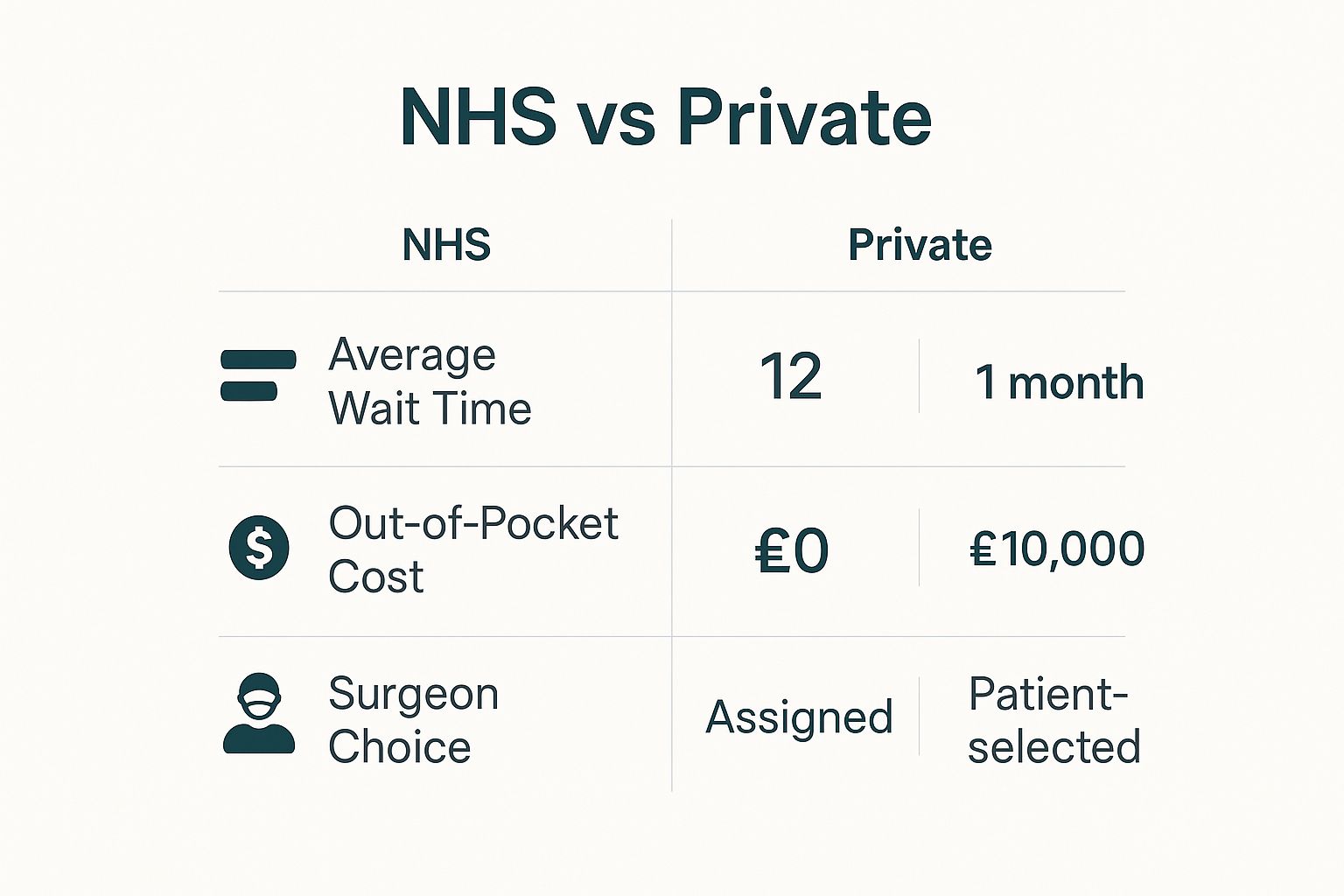.webp)
Right, let's talk numbers. When you start looking into private knee replacement, you’ll see figures anywhere from £10,000 to £17,800 across the UK. But that's just the headline price. The final bill depends on where the hospital is, the surgeon’s reputation, and even the type of artificial joint they use.

The first price you see for a private knee replacement is really just a starting point. Think of it like the sticker price on a car – it gives you a ballpark figure, but lots of other things will shape the final amount you actually pay. Getting your head around these variables from the get-go is the key to budgeting properly and avoiding any nasty surprises later on.
That initial number nearly always covers the main event: the surgery itself. But to understand the true cost, you need to look at everything that goes into that final figure.
The cost for a new knee can swing quite a bit. Looking at 2024 data, the average private knee replacement can set you back anywhere from £10,000 to almost £18,000. Location is a huge factor here. For instance, you’ll generally find more affordable options in the North East, while prices in the East of England or London creep towards the top end of that scale.
To give you a clearer picture, here’s a rough guide to what you might expect to pay, depending on the provider and region.
This table is just a snapshot, of course. For a really detailed breakdown of specific procedures and their costs, it's always best to check out a full private hospital price list, like ours here: https://www.thevesey.co.uk/price-list.
So, what are you actually paying for? The quote you get is a package deal covering several key services. The big ones are the surgeon's fee, the anaesthetist's fee, the hospital's charges for using the operating theatre and your room, and, of course, the price of the prosthetic knee joint itself.
The experience of your surgeon is a significant factor. A highly sought-after consultant with years of specialised experience will naturally command a higher fee than a less experienced surgeon, reflecting their expertise and track record of successful outcomes.
But the costs don't necessarily stop when you leave the hospital. The real cost of a knee replacement often needs to include post-operative care and rehab. You might need to arrange comprehensive home care services to help out while you're getting back on your feet. Factoring these support systems into your budget is vital for a complete financial plan.
When you're facing knee replacement surgery in the UK, you come to a major fork in the road. One path takes you through the National Health Service (NHS), and the other leads to private healthcare. Getting to grips with the real differences between these two routes is the key to making a choice that fits your health, your finances, and your life.
The main distinction is pretty straightforward: one is free at the point of care, while the other involves a serious financial commitment. The NHS delivers brilliant surgical care without any direct cost, which is why it's a lifeline for so many. But that accessibility often comes with a big catch—waiting times, which can be long and frankly, unpredictable.
You could think of it like planning a crucial journey. The NHS is like a reliable public bus. It will get you where you need to go safely and without a fare, but you have to stick to its schedule. That might mean waiting a lot longer than you’d like before you can even get started.
The private path, on the other hand, is like calling a taxi. You get speed, flexibility, and a much more personalised experience. You can pick your surgeon, book an operation date that suits you, and often recover in a more comfortable setting like a private room. The trade-off, of course, is the hefty fare you have to pay for that convenience.
For many people, the biggest pull of going private is simply skipping the long queues. This isn't just about getting it over with; it’s a critical health decision. Living with constant pain and limited mobility while you wait for surgery can take a huge toll on your quality of life, your mental wellbeing, and even how well the operation works in the end.
The infographic below really highlights the key differences in waiting times, costs, and your choice of surgeon between the two options.

As you can see, the private route offers a dramatically shorter wait for a significant cost, whereas the NHS removes the financial stress but demands patience.
Ultimately, the decision often boils down to cost versus speed. The NHS performed around 70,000 knee replacements last year, a testament to its incredible capacity. Yet, the contrast is stark. Long delays in treatment have been linked to worse outcomes for patients and prolonged disability.
Opting for private treatment means you take back control of your surgical timeline. The main benefits usually include:
The real power of the private sector lies in its ability to offer timely care. When chronic knee pain is destroying your ability to work, sleep, and just enjoy life, a shorter wait can make all the difference.
Of course, the knee replacement cost is the biggest hurdle. It’s a major financial decision that needs careful thought. If you're considering this option, it's worth understanding exactly what private healthcare involves. The wider financial climate also plays a part, as discussions around how social care is paid for often show, such as when ministers considering council tax rises to cover social care funding hit the headlines. In the end, the right choice is personal. It’s about weighing the immediate relief offered by private care against the cost-free, but slower, treatment provided by the NHS.

When a quote for private knee surgery lands in your inbox, it can feel a bit like trying to decipher a complex code. The big number at the top gives you a ballpark figure, but the real story is buried in the small print. Understanding what’s covered—and just as importantly, what’s not—is the key to building a realistic budget and avoiding any nasty surprises later on.
Think of it as a detailed receipt for a major life investment. Most private hospitals now offer a fixed-price package, which bundles the essential components of your surgical journey into one clear fee. This is designed to give you certainty, but to truly get a handle on the final knee replacement cost, you need to look a little deeper.
A standard private knee replacement quote bundles the big-ticket items into a single price. It’s an all-inclusive approach designed to make things simpler, so you aren’t hit with separate bills from the surgeon, the anaesthetist, and the hospital.
Generally, you can expect the core components to be covered:
This bundled model is a huge help for planning. The real trick, however, is spotting the expenses that sit just outside this fixed-price bubble.
It’s often the services that happen before you’re admitted or after you’re discharged where unexpected bills can crop up. These are still essential parts of your treatment journey, but they’re not always part of the main surgical package.
It is absolutely vital to ask your provider for a crystal-clear list of what is and isn't included. Think of it as checking the "terms and conditions" before you sign. A little proactivity here can save you a lot of stress down the line.
A comprehensive quote should bring clarity, not confusion. The most common 'hidden costs' are related to the diagnostic and recovery phases, which are often billed separately from the surgical procedure itself.
Here’s a breakdown of the most common things that might not be part of your fixed-price package:
To help you see the difference clearly, here’s a quick comparison of what to expect.
This table breaks down what’s typically part of a fixed-price package versus what might be billed as an extra. Knowing this helps you budget accurately and ask the right questions from the start.
Understanding these potential add-ons is the secret to creating a truly complete budget. For those looking at ways to manage the total spend, there are various strategies for making private healthcare more affordable that can help you plan effectively. By asking these questions upfront, you can turn a confusing quote into a clear financial roadmap for your journey back to mobility.
Ever wondered why two people can have the exact same operation yet walk away with completely different bills? When it comes to the final knee replacement cost, there isn't a single set price. Instead, your total bill is a blend of several key factors, each one adding its own weight to the final figure. Getting your head around these variables is the first step to planning your finances and seeing the whole picture.
Think of it like commissioning a bespoke suit. The final price depends on the tailor's reputation, the quality of the fabric, the complexity of the design, and even where their shop is located. Your knee surgery is no different; every choice you and your surgeon make directly influences the final invoice.
Where you have your surgery plays a surprisingly big role in the cost. Just as house prices vary wildly across the country, so do the costs of private medical procedures. A knee replacement in a central London hospital will almost certainly be more expensive than the same operation in a clinic up north.
This price gap is driven by higher running costs in major cities—everything from clinic rent and staff wages to general admin. It's not uncommon for a procedure in a premium London facility to be 15-25% more expensive than one in a regional hospital, simply because of its postcode.
Not all surgeons or hospitals are priced the same, and for good reason. Choosing a surgeon is a bit like hiring a master craftsman versus a skilled apprentice—both are talented, but experience and reputation command a premium. A highly respected consultant with thousands of successful knee replacements under their belt will naturally have higher fees than a surgeon who is earlier in their career.
Likewise, the choice of hospital makes a huge difference:
The reputation and facilities of the hospital you pick are a major part of your bill.
It's a balance between comfort and cost. While a luxury environment can make recovery more pleasant, a more functional clinic can deliver the same excellent surgical result for a lower price.
The prosthetic knee joint itself is a major cost, and just like cars, they come in different models with different price tags. The implant your surgeon recommends will hinge on your age, your lifestyle, and the specific condition of your knee.
Here’s a quick rundown of the common options:
The difference in material and manufacturing complexity means a custom or high-performance implant can easily add thousands of pounds to your final bill.
Finally, not all knee replacements are created equal. A primary (first-time) total knee replacement is the standard procedure, but some situations demand a more complex and, therefore, more expensive approach.
A revision surgery, for instance, is where a surgeon has to replace a worn-out or failed implant from a previous operation. This is a far trickier procedure than a first-time replacement. It often requires specialised tools, a longer time in theatre, and a more intricate implant—all of which drive up the cost significantly. A revision surgery can easily cost 50% more than a primary knee replacement due to its intricate nature.

Getting your head around the quote is the first major hurdle. Next up: figuring out how to actually pay for it.
Tackling the financial side of your knee replacement can feel just as daunting as the surgery itself, but you really have a few clear paths forward. Whether you're using private medical insurance, paying out of pocket, or looking into finance options, having a clear strategy is key.
This section is a practical roadmap for managing the knee replacement cost. The aim is to give you the confidence to handle the finances so you can focus your energy where it belongs—on your recovery and getting back to the life you want to live.
For many people, private medical insurance is the go-to route for funding their surgery. If you have a policy, your very first step should be to get in touch with your provider and confirm exactly what your level of cover is. Never assume everything is included, because policies can vary enormously.
You'll need to ask some specific questions to avoid any nasty surprises or shortfalls down the line. Check if your chosen surgeon and hospital are on their approved list, and get clarity on the financial limit of your cover. Most importantly, you must get a pre-authorisation code from your insurer before you book anything.
The process is fairly straightforward:
Navigating the world of insurance can feel like learning a new language. For a deeper dive into how policies work and what to look for, you can learn more by understanding health insurance options in our detailed guide.
If you don’t have insurance or your policy won’t cover the full amount, paying for the procedure yourself is the next option. This is often called being a 'self-pay' or 'self-funding' patient. To make things more predictable, most private hospitals offer fixed-price packages.
These packages are designed to give you peace of mind. They bundle all the core costs—the surgeon’s fees, your hospital stay, the anaesthetist, and the implant itself—into one single, upfront figure. It’s a great way to remove the risk of receiving a string of unexpected bills after your operation.
When paying the full amount in one go just isn't realistic, medical loans and finance plans open up another path. Many private healthcare providers work with specialist finance companies that offer loans designed specifically for medical procedures.
These loans let you spread the knee replacement cost over a set period, often with an initial interest-free term to make it more manageable. It's a great option, but it's vital to treat it like any other form of borrowing.
Before you commit, make sure you carefully check:
Weighing the pros and cons is essential. While a loan gives you immediate access to treatment, the interest will add to the overall cost. Always make sure the monthly repayments are comfortably within your budget before signing anything. This way, your financial health will be just as strong as your physical health during your recovery.
The world of orthopaedics is always moving forward, and it’s not just about refining surgical techniques. There’s a huge push towards greater efficiency, creating smarter pathways that help manage—and in some cases, lower—the overall cost of a knee replacement.
This progress proves that better patient outcomes and greater cost-effectiveness can absolutely go hand-in-hand. It's all about optimising the entire patient journey. By making each step more efficient, hospitals can cut down on overheads, shorten stays, and pass those savings on.
One of the biggest shifts we've seen is the move towards day-case surgery, particularly for partial knee replacements where only one compartment of the knee is resurfaced. Instead of spending several nights in hospital, suitable patients can have their surgery and be back recovering in their own home on the very same day.
This streamlined model drastically reduces the use of hospital resources like overnight nursing and accommodation—two of the biggest items on any surgical bill.
The logic behind day-case surgery is refreshingly simple: a shorter hospital stay means a lower overall cost and a more comfortable recovery for the patient. It’s a genuine step forward in making joint replacement more efficient.
A key development within the UK’s NHS has been the introduction of day surgery pathways for unicompartmental knee replacement (UKR). Research looking at over 2,000 UKR patients found this approach shaved an average of 2.2 nights off the typical hospital stay.
This resulted in huge savings for the NHS, estimated at around £1,429 per patient.
Supporting this shift are Enhanced Recovery After Surgery (ERAS) programmes. These aren't just about a quicker discharge; they're evidence-based protocols designed to get you back on your feet faster and more safely. Think of it as a holistic approach to your care.
ERAS programmes bring several key elements together:
These modern protocols are central to speeding up recovery times. You can learn more about the specific operations that benefit from them in our guide to advanced knee replacement procedures.
By combining surgical innovation with smarter recovery pathways, the healthcare system can deliver high-quality care that is both clinically effective and financially sustainable.
Getting your head around knee replacement surgery throws up a lot of questions, especially when it comes to the cost. We’ve put together some straight answers to the most common queries we hear from patients trying to navigate the financial side of things.
Our aim is to give you clear, simple information so you can feel more confident about your decisions. Let’s tackle the big ones: insurance, saving money, what happens if things go wrong, and how long you might be waiting on the NHS.
It really boils down to the fine print of your specific policy. Most plans will pick up the tab for the major expenses—the surgery itself, your hospital stay, and the anaesthetist’s fees. But you will almost certainly have an excess to pay first. Think of this as your contribution before the insurance company steps in.
It’s also pretty common for policies to put a cap on outpatient services, which often includes your crucial post-op physiotherapy sessions.
The single most important thing you can do is call your insurer for pre-authorisation before you agree to anything. Ask them for an itemised breakdown of what they will and won't cover. It’s the only way to avoid any nasty surprises down the line.
Yes, absolutely. There are a few smart ways to manage the final bill. The hospital's location is a huge factor; choosing a facility outside of a major hub like London can bring the price down considerably.
Also, keep an eye out for providers offering fixed-price ‘self-pay’ packages. These are a great way to get a single, all-in figure for the core costs, which helps prevent the budget from spiralling.
This is a non-negotiable question to ask your provider upfront. Most reputable private hospitals will include a ‘complication guarantee’ as part of their fixed-price packages. This usually covers the cost of treating any direct surgical complications that crop up within a set period after your operation.
The catch is that the terms can vary wildly from one place to another. You need to get crystal clear on what's covered, for how long, and what the process is if issues arise after that guarantee runs out. Long-term care often isn't included and could lead to significant extra costs.
NHS waiting times for a knee replacement can be a real postcode lottery, changing dramatically depending on where you live and which NHS Trust you fall under. The official target is for treatment within 18 weeks of being referred, but in reality, many people are waiting far longer than that.
The best way to get a realistic idea is to check the latest waiting time data for your local hospital trust. You can find this on the NHS website, and it will give you a much clearer picture of what to expect in your specific area.
At The Vesey, we believe in clear, transparent pricing and exceptional care. To talk through your options and get a detailed, no-obligation quote, please visit us at https://www.thevesey.co.uk.

